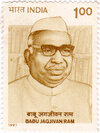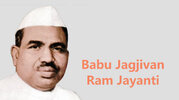Jagjivan Ram (5 April 1908 – 6 July 1986) known popularly as Babuji, was an Indian independence activist and politician from Bihar. He was instrumental in the foundation of the All India Depressed Classes League, an organisation dedicated to attaining equality for untouchables, in 1935 and was elected to Bihar Legislative Assembly in 1937, after which he organised the rural labour movement.

In 1946, he became the youngest minister in Jawaharlal Nehru's interim government, the first cabinet of India as a Labour Minister and also a member of the Constituent Assembly of India, where he ensured that social justice was enshrined in the Constitution. He went on to serve as a minister with various portfolios for the next 30 years as a member of the Indian National Congress (INC). Most importantly, he was the Defence Minister of India during the Indo-Pak war of 1971, which resulted in the creation of Bangladesh. His contribution to the Green Revolution in India and modernising Indian agriculture, during his two tenures as Union Agriculture Minister are still remembered, especially during the 1974 drought when he was asked to hold the additional portfolio to tide over the food crisis.
Though he supported Prime Minister Indira Gandhi during the Emergency (1975–77), he left Congress in 1977 and joined the Janata Party alliance, along with his Congress for Democracy. He later served as the Deputy Prime Minister of India (1977–79); then in 1981, he formed Congress (J). At his death, he was the last surviving minister of the Interim Government and the last surviving original member of the first cabinet of independent India. Including his service during the Interim Government, his total tenure of over 30 years in various ministries remains the longest of any Indian federal minister.
Every year, on 5th April, Babu Jagjivan Ram Jayanti is celebrated as it is the birthday of Jagjivan Ram, a long-time political leader. Jagjivan Ram was born in Bihar on 5th April 1908, into a caste that was known as “the untouchables.” Jagjivan Ram was not just a politician; he dedicated most of his life fighting for bringing out voices of the oppressed castes of the country and for the freedom of India. His contributions to the country as a social reformer were far more intense than the other large influences because he was a Dalit himself.
History of the celebration
Jagjivan Ram was a member of Jawaharlal Nehru’s First Cabinet, where he was a member of the Constituent Assembly of India and the youngest minister. Only a very few people emphasized strongly on the principles of social justice, and he was one among them.
Jagjivan Ram, as a fighter for social justice, was a very important part in the creation of All Indian Depressed Classes League during the year 1935. The organization was focused on providing equality and welfare for the oppressed people in society.
He is also popular for the mass organization of several movements that were completely dedicated to the rural labor welfare in 1937 after he became a part of the Legislative Assembly of Bihar. Later, he became a member of the Indian National Congress, where, for over forty years, he worked whole-heartedly in many portfolios.
The fierce repertoire of this Dalit leader led to the celebrations for his contributions to every citizen in India and for his personality. His cremation site has been made into a memorial to honor his legacy, and it is called the “Samata Sthal.” India observes his birth anniversary as the “Samata Diwas” or the “Equality Day” to commemorate his war against various forms of social oppression and caste discrimination and his ideas to promote a social community with equality and welfare

In 1946, he became the youngest minister in Jawaharlal Nehru's interim government, the first cabinet of India as a Labour Minister and also a member of the Constituent Assembly of India, where he ensured that social justice was enshrined in the Constitution. He went on to serve as a minister with various portfolios for the next 30 years as a member of the Indian National Congress (INC). Most importantly, he was the Defence Minister of India during the Indo-Pak war of 1971, which resulted in the creation of Bangladesh. His contribution to the Green Revolution in India and modernising Indian agriculture, during his two tenures as Union Agriculture Minister are still remembered, especially during the 1974 drought when he was asked to hold the additional portfolio to tide over the food crisis.
Though he supported Prime Minister Indira Gandhi during the Emergency (1975–77), he left Congress in 1977 and joined the Janata Party alliance, along with his Congress for Democracy. He later served as the Deputy Prime Minister of India (1977–79); then in 1981, he formed Congress (J). At his death, he was the last surviving minister of the Interim Government and the last surviving original member of the first cabinet of independent India. Including his service during the Interim Government, his total tenure of over 30 years in various ministries remains the longest of any Indian federal minister.
Every year, on 5th April, Babu Jagjivan Ram Jayanti is celebrated as it is the birthday of Jagjivan Ram, a long-time political leader. Jagjivan Ram was born in Bihar on 5th April 1908, into a caste that was known as “the untouchables.” Jagjivan Ram was not just a politician; he dedicated most of his life fighting for bringing out voices of the oppressed castes of the country and for the freedom of India. His contributions to the country as a social reformer were far more intense than the other large influences because he was a Dalit himself.
History of the celebration
Jagjivan Ram was a member of Jawaharlal Nehru’s First Cabinet, where he was a member of the Constituent Assembly of India and the youngest minister. Only a very few people emphasized strongly on the principles of social justice, and he was one among them.
Jagjivan Ram, as a fighter for social justice, was a very important part in the creation of All Indian Depressed Classes League during the year 1935. The organization was focused on providing equality and welfare for the oppressed people in society.
He is also popular for the mass organization of several movements that were completely dedicated to the rural labor welfare in 1937 after he became a part of the Legislative Assembly of Bihar. Later, he became a member of the Indian National Congress, where, for over forty years, he worked whole-heartedly in many portfolios.
The fierce repertoire of this Dalit leader led to the celebrations for his contributions to every citizen in India and for his personality. His cremation site has been made into a memorial to honor his legacy, and it is called the “Samata Sthal.” India observes his birth anniversary as the “Samata Diwas” or the “Equality Day” to commemorate his war against various forms of social oppression and caste discrimination and his ideas to promote a social community with equality and welfare


